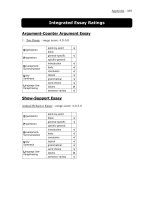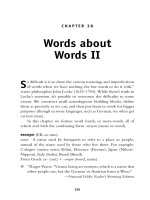Words about Books and Writing
Bạn đang xem bản rút gọn của tài liệu. Xem và tải ngay bản đầy đủ của tài liệu tại đây (107.51 KB, 12 trang )
W
hat is writing? Distilling your thoughts and putting their
essence on paper. It doesn’t require any fancy equipment—a
five-cent pencil works just as well as a $50 gold-tipped “writing
instrument.” A beach cottage might not provide a writer any more
inspiration than a tiny room, with a window perhaps, to stare out
of and do nothing. Ah! What could be easier—or more difficult—
than writing? Let’s examine a few words from the world of
literature.
roman à clef (ro-mahn ah KLAY), plural romans à clef
noun A novel that depicts historical figures and events under the
guise of fiction.
From French, literally, a novel with a key.
● “Gradually it also became known that Kinder’s sprawling,
unpublished novel was a roman à clef about the author’s com-
plicated and boisterous friendship during the 1970s with Ray-
mond Carver, when both men were in the San Francisco Bay
area.”
—Washington Post
28
CHAPTER 7
Words about Books
and Writing
cmp01.qxd 7/21/05 12:12 PM Page 28
orihon (OR-ee-hon)
noun A book or manuscript folded like an accordion: a roll of
paper inscribed on one side only, folded backwards and forwards.
From Japanese, ori (fold) + hon (book).
A word sharing the same root is origami (ori + -gami, kami
[paper]), the Japanese art of paper folding that can coax a whole
menagerie from a few flat sheets of paper.
● “He created an orihon binding—an accordion-style technique
that allowed the book to expand to more than 60 feet.”
—Electronic Publishing
amphigory or amphigouri (AM-fi-gor-ee)
noun A nonsensical piece of writing, usually in verse form, typi-
cally composed as a parody.
From French amphigouri.
● “More jeers than cheers currently greet the amphigories of
Father Divine, and the followers of kindred dark-town messi-
ahs are noisier than they are numerous.”
—Policy Review
Writer and illustrator Edward Gorey (1925–2000), known for his
dark cartoons, illustrations, stories, and poems, called his collection
Amphigorey. More at .
conspectus (kuhn-SPEK-tuhs)
noun A general survey, synopsis, outline, or digest of something.
From Latin conspectus, past participle of conspicere,from con- (com-
plete) + spicere (to look).
W ORDS ABOUT BOOKS AND WRITING
29
Assumptions are the termites of relationships.
—
H
ENRY
W
INKLER
, actor (1945–)
cmp01.qxd 7/21/05 12:12 PM Page 29
● “Meanwhile, for a well-informed, critical, independent-
minded but essentially traditional view of the subject, we have
a new conspectus by James D. Tracy. He is masterly in absorb-
ing information and masterful in organizing it.”
—New York Times Book Review
Pro is opposite to con. But conspectus is not necessarily opposite to
prospectus. As for congress and progress,well, I’m not so sure.
magnum opus (MAG-num OH-puhs)
noun A great work of literature, music, art, etc., especially the
finest work of an individual.
From Latin magnum opus,from magnum, neuter of magnus (large),
opus (work).
● “Bespectacled, bearded and balding, Mr. [Grigory] Chkhar-
tishvili is faintly ill at ease about fame. For years, he earned his
living translating Japanese literature and working on what he
still considers his magnum opus, a gloomy book entitled ‘The
Writer and Suicide.’ His idea of a good time is to stroll around
a cemetery.”
—Wall Street Journal
30
ANOTHER WORD A DAY
Those who failed to oppose me, who readily agreed with me,
accepted all my views, and yielded easily to my opinions, were those
who did me the most injury, and were my worst enemies, because,
by surrendering to me so easily, they encouraged me to go too far . . .
I was then too powerful for any man, except myself, to injure me.
—
N
APOLÉON
B
ONAPARTE
, emperor of France (1769–1821)
cmp01.qxd 7/21/05 12:12 PM Page 30
A
language is the soul of its people. This is nowhere more
profoundly illustrated than in Yiddish, the language of eastern
and central European Jews and their descendants. A tongue full of
wit and charm,Yiddish embodies a deep appreciation of human
behavior in all its colorful manifestations. The word Yiddish comes
from German Judisch, meaning Jewish. But it is not the same as
Hebrew, even though it is written in Hebrew script.
Here’s what author Isaac Bashevis Singer, who wrote in Yid-
dish, had to say about the language in his 1978 Nobel Prize accept-
ance speech:
Yiddish language—a language of exile, without a land,
without frontiers, not supported by any government, a lan-
guage which possesses no words for weapons, ammunition,
military exercises, war tactics. . . . There is a quiet humor in
Yiddish and a gratitude for every day of life, every crumb
of success, each encounter of love. The Yiddish mentality is
not haughty. It does not take victory for granted. It does
not demand and command but it muddles through, sneaks
by,smuggles itself amidst the powers of destruction, know-
ing somewhere that God’s plan for Creation is still at the
31
CHAPTER 8
Words Borrowed
from Yiddish
cmp01.qxd 7/21/05 12:12 PM Page 31
very beginning. ...In a figurative way,Yiddish is the wise
and humble language of us all, the idiom of frightened and
hopeful Humanity.
Many everyday English words such as bagel,klutz, and kibitz are
borrowed from Yiddish. In this chapter we look at a few other Yid-
dishisms that have enriched the English language.
chutzpah (KHOOT-spuh, HOOT-), also chutzpa
noun Shameless impudence; brazen nerve; gall; effrontery.
From Yiddish khutspe,from Late Hebrew huspa.
● “Bill Gates, the company’s chairman, even had the chutzpah to
say that this week’s ruling was a challenge to ‘healthy competi-
tion in the software industry.’”
—The Economist
32
ANOTHER WORD A DAY
Never attribute to malice that which can be
adequately explained by stupidity.
—
H
ANLON
’
S
R
AZOR
Bard Bettered
Several years ago, I heard a delightful story about Isaac Bashe-
vis Singer’s explanation of the word chutzpah. The veracity I
cannot vouch for, but it doesn’t detract from the story:
Singer was telling an audience about the difficulties of
rendering Yiddish into any other language, and that some
words were in fact untranslatable. As an example Singer
picked the word chutzpah,saying that its being an untranslat-
able word he was unfortunately not in a position to explain
what it meant, but he could offer a story as an illustration.
Singer went on to say that during his childhood, his parents
would often take him on house visits, a frequent destination
being the home of a Jewish writer by name of Joseph Kowal-
ski. In this house the young Singer came across a Yiddish-
language book with the following title: Hamlet, by William
Shakespeare. Edited, Enlarged, and Improved by Joseph Kowalski.
This, Singer told his audience, is chutzpah.
—Jacob Gammelgaard, Copenhagen, Denmark
cmp01.qxd 7/21/05 12:12 PM Page 32









